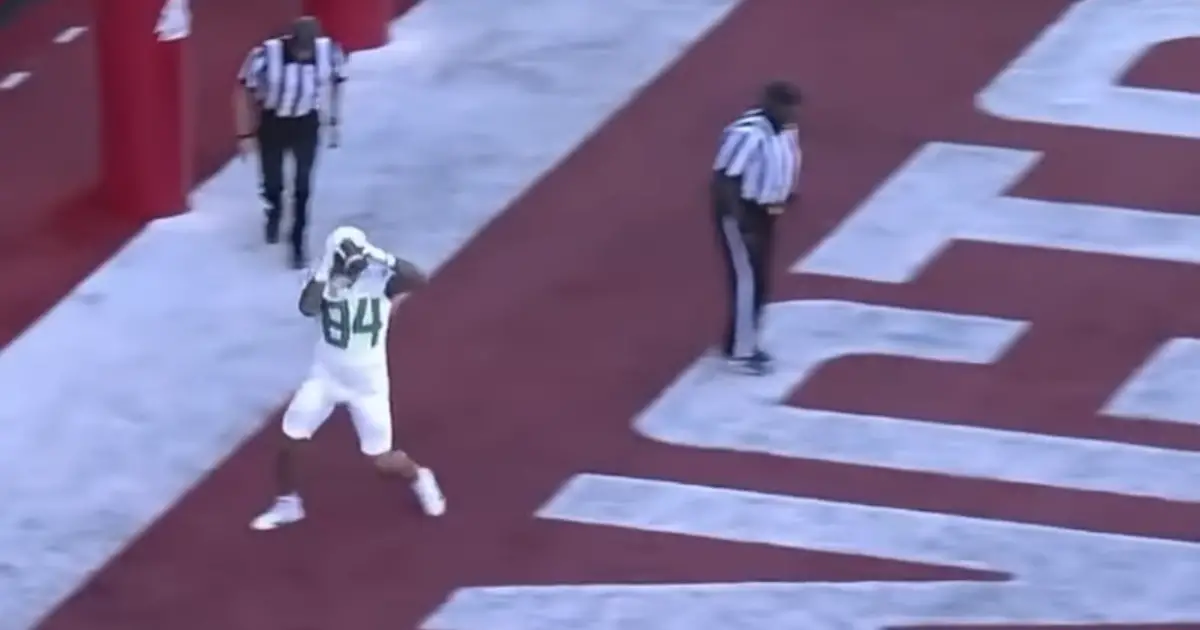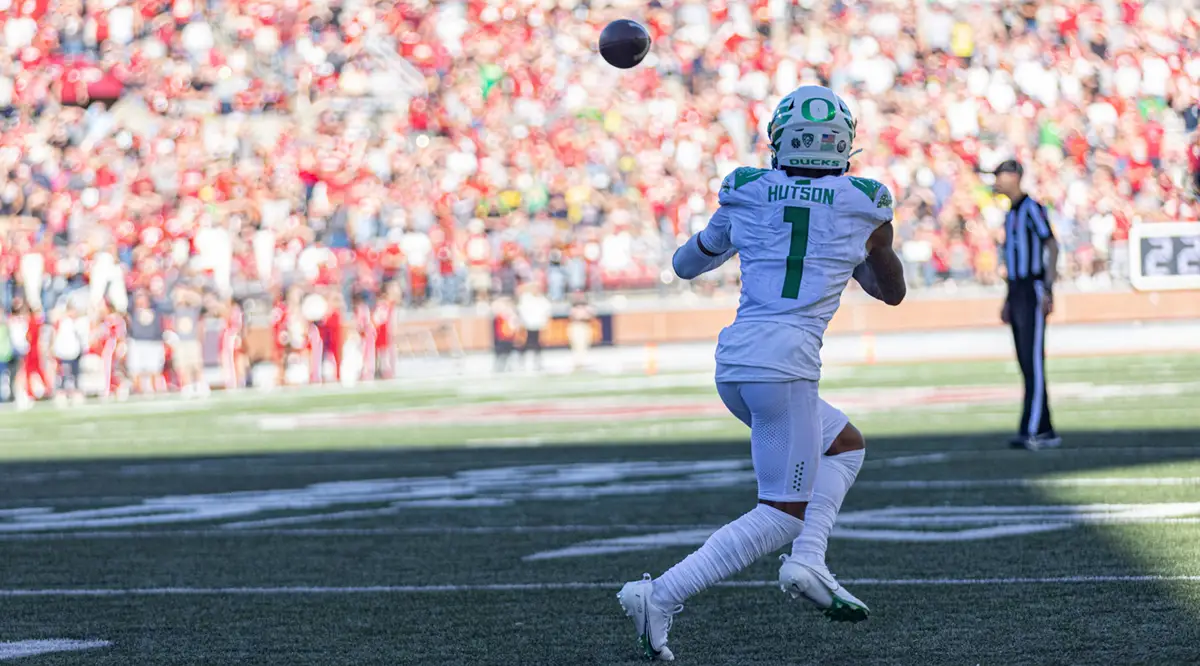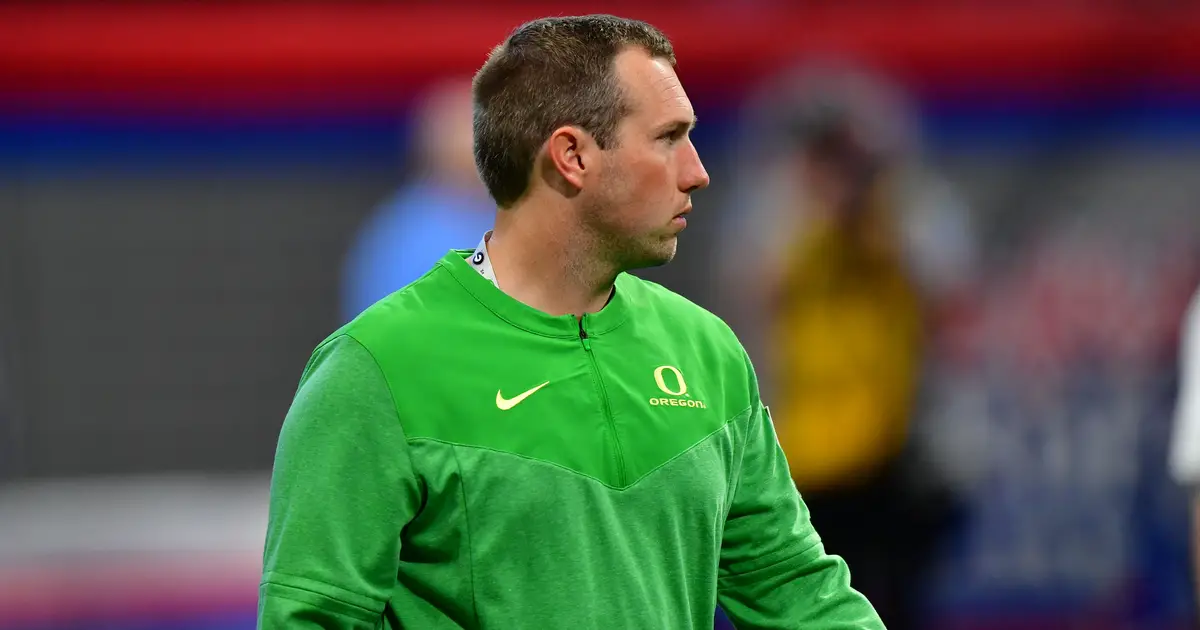Kenny Dillingham’s offense has taken fans by storm and is a breath of fresh air after the previous administration. His system is dynamic and gets players into space to make big plays, but Dillingham is also not afraid to put in a jumbo formation and power the ball forward in short-yardage situations. It is a nightmare for opposing teams to prepare for, as it is a rather complicated offense.
However, Dillingham’s play calling needs improvement, and this was completely on display against Washington State last Saturday. Oregon moved the ball at will in the open field, whether that was running or passing. Perhaps the most telling stat was that over the course of the game, Oregon accumulated 624 yards of total offense but only scored 37 points. That’s because when the Ducks got inside the Washington State 10-yard line, the offense came to a halt, or worse, went backwards. Oregon’s first three drives into the red zone resulted in three field goals, nine points.
In this part of the field, the Dillingham offense went from dynamic and explosive to plodding and predictable. Oregon focused exclusively on plays behind the line of scrimmage, whether running the ball or quick passes into a bubble screen. All the plays were focused on getting the ball to play makers behind the line of scrimmage rather than passing the ball vertically. Washington State read this and just crashed down onto Oregon’s offensive line, who remarkably still haven’t given up a sack on the year. However, with an entire defense running downhill at the line of scrimmage, there isn’t a whole lot the offensive line can do. It’s a numbers game, and the offense was bound to struggle, so credit Washington State and their preparation.
Towards the end of the 4th quarter, in a goal line situation, it came as no surprise to anyone when Oregon lined up with their jumbo package in the I-formation, seemingly prepared to run the ball yet again into the Cougar’s linemen. But this time, Nix instead stepped back and lobbed a short pass to a wide open Cam McCormick. Where was this play earlier in the game?

Cam McCormick was wide open for an easy touchdown catch as Oregon did something unexpected at the goal line.
There is plenty of footage of Oregon over the previous two weeks powering the ball forward in short-yardage situations, and Washington State was prepared for it. Those early trips to the red zone should have ended with a play like this for a touchdown rather than a field goal.
Dillingham is a brilliant offensive coordinator, but he needs to show more variety to his opponents. His play calling in short-yardage situations the previous week against BYU was a work of art: he seemingly showed quarterback sneak and instead handed it off to a running back for easy yards. He had BYU’s defense mentally and physically exhausted. He needs to learn to open that playbook earlier in the game.
Don’t Abandon the Run Game
For a couple series, it felt like Oregon was abandoning the run game and starting to air it out for fear of losing the game. Most notably, this occurred after a Trikweze Bridges interception. The series went as follows: a pass that went for negative two yards, an incompletion, and another incompletion that wouldn’t have resulted in a first down even if it was caught. What happened to the run game?
We saw the same problem against Georgia, where a sense of desperation set in and the play calling became all about passing plays, turning one-dimensional in the process. The key to Oregon’s success and quarterback Bo Nix’s success all stems from an effective run game — it sets up the rest of the offense.
What is more frustrating is that the Oregon run game was highly successful in the open field against Washington State, and there was plenty of time on the clock. The run game sets up the passing game, especially opening up those deep passing plays by forcing opposing safeties to play closer to the line of scrimmage.
Going to a pass-only offense can easily set the offense behind schedule and behind the sticks, leading to long third downs. That is exactly what happened after the much-needed turnover mentioned before. If the run game is effective and there is time on the clock, Dillingham must continue to run the ball, especially when Oregon is down and trying to claw their way back.
Dillingham Needs to Take Some Early Shots
Oregon hasn’t taken too many deep shots on the year so far. But what became blatantly apparent as the game progressed was that Oregon’s receivers were getting separation from Washington State defensive backs. And the play that put Oregon in the lead for the first time was a deep shot to Troy Franklin. Franklin, on the whole, had a fantastic day and made a bunch of critical catches to keep drives alive, but the play that kept hopes of a comeback alive was a 50-yard touchdown reception.

Kris Hutson makes a catch against Washington State.
Earlier in the game, Kris Hutson had a nice grab that put Oregon in the red zone, as well. These receivers have done an incredible job blocking all year, and now it is time for some more deep shots to feed these receivers. They can do it, they just need the opportunities, and there should be many more opportunities in the coming weeks.
Nix racked up 428 passing yards in the game — one of the most successful games of his career. Nix can make those deep throws, and Oregon’s receiver talent is really starting to come into its own. It is time to unleash them earlier in the game and put some added stress on opposing defenses.
Dillingham is a great offensive coordinator and will continue to grow with experience. Oregon escaped the Palouse with a win, but there are still a lot of lessons for Dillingham to learn. It is far more fun to learn those lessons through victory rather than defeat, though the truth is, the game never should have been that close. Oregon had the talent to win by three scores.
Time to learn those lessons and prepare for Stanford this week. The Cardinal aren’t a terribly good team this year, and Oregon’s offense should have no trouble in the red zone, though it’s on Dillingham to make those calls.
David Marsh
Portland, Oregon
Top Photo By Tom Corno
 Andrew Mueller, the FishDuck.com Volunteer Editor for this article, works in higher education in Chicago, Illinois.
Andrew Mueller, the FishDuck.com Volunteer Editor for this article, works in higher education in Chicago, Illinois.
Related Articles:
Is 'Flexible Symmetry' the Answer to Big-10 Scheduling?
Ducks Football 2026: Breaking Down Strengths And Weaknesses
These Ducks Will Have Monster Second Seasons as Starters
Oregon Football: Early 2026 Ranking Projections
FishDuck Foaming Over Upside of 2026 Diamond Ducks
Unbelievable...Same SEC Stuff, Different Day

David Marsh is a high school social studies teacher in Portland, Oregon. As a teacher he is known for telling puns to his students who sometimes laugh out of sympathy, and being both eccentric about history and the Ducks.
David graduated from the University of Oregon in 2012 with Majors in: Medieval Studies, Religious Studies, and Geography. David began following Ducks Football after being in a car accident in 2012; finding football something new and exciting to learn about during this difficult time in his life. Now, he cannot see life without Oregon football.

